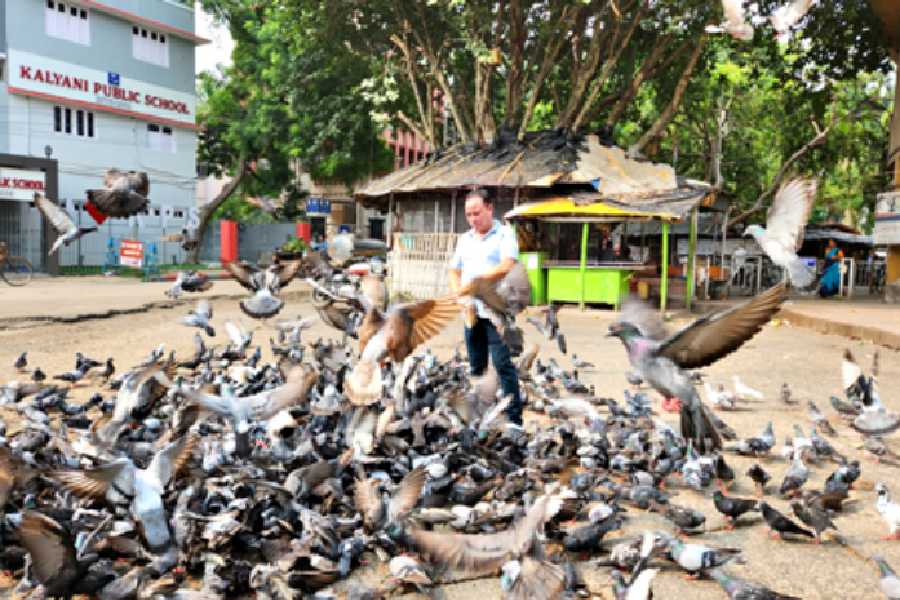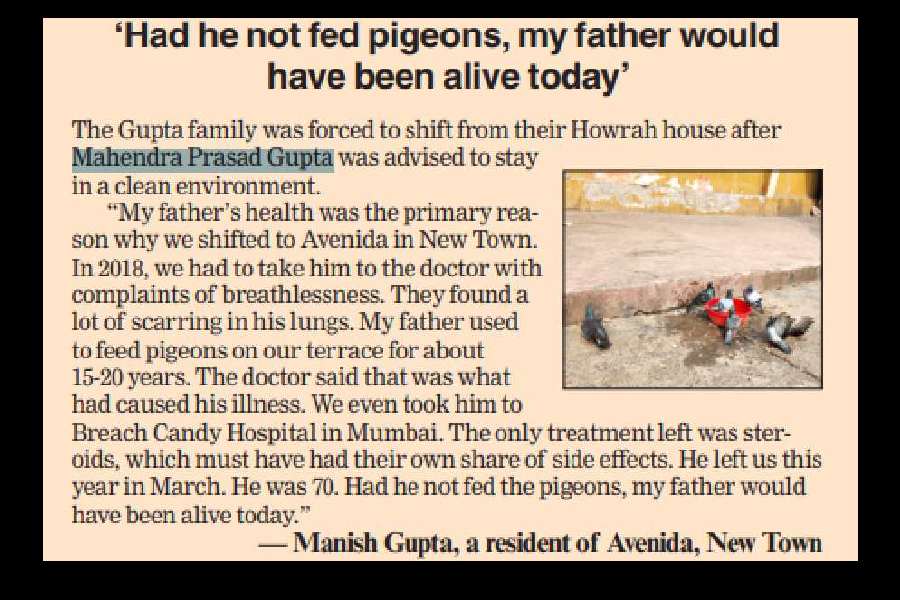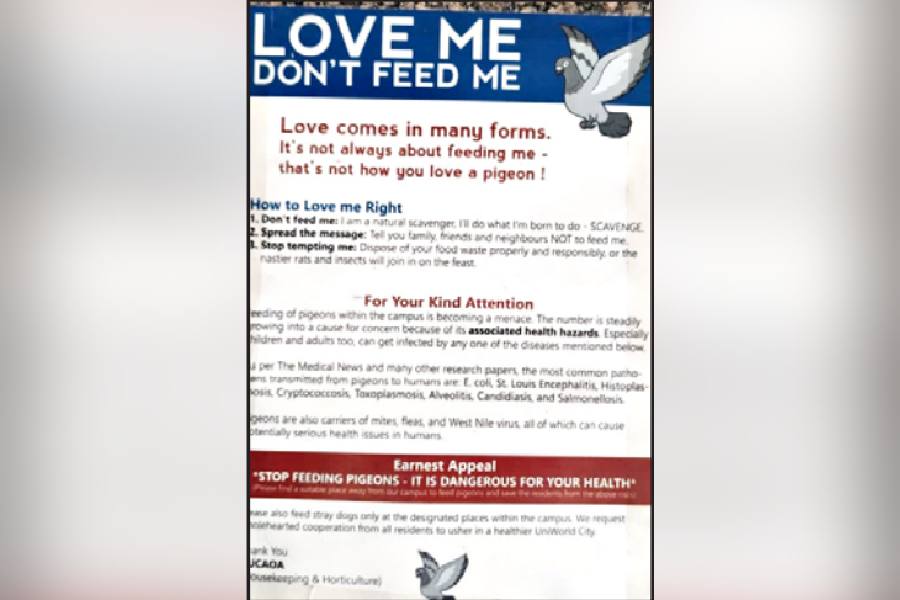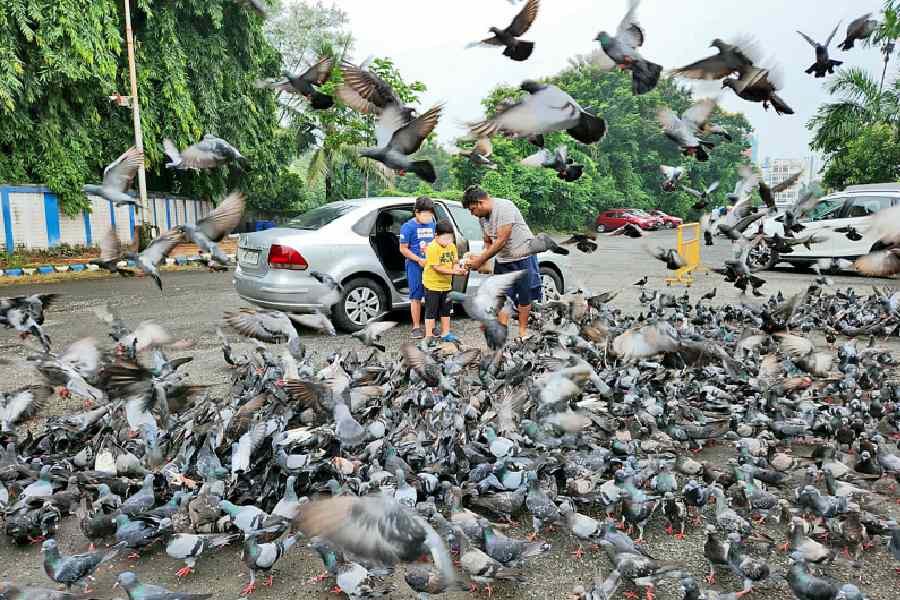A toddler runs into a sea of pigeons feeding on the ground. Startled, the birds take flight, whooshing over the child’s head and making him squeal in delight.
Passers-by stop to watch the innocent scene play out and the boy’s mother gets the picture of a lifetime. But what none of them realise is that they all just had a brush with a potential health risk. Wild pigeons are carriers of multiple diseases and pose an unequivocal hazard to the health of humans.
While a section of residents now wants to stop harbouring pigeons around them, bird lovers and people of faith find it unethical and continue feeding them.
Birds of a feather
A spot notorious for pigeons in the township is the parking lot of City Centre facing DB Block. Every morning from about 7am, residents drive over and hand out grains to the hundreds of birds that swoop down from the trees nearby.
The pigeons welcome the feeders and fly towards their cars. They spread out on the ground, on the cable lines overhead and on the guardrails used by the mall’s security staff... Someone has kept a couple of earthen pots on the footpath and residents fill them with fresh water when they come. The air, however, is thick with the pungent smell of toxic pigeon poop.
At CK Market too, the parking lots has become the abode of pigeons. So much so that most shoppers don’t even bother navigating their cars into the lot, lest it disturb the birds.
Blissful ignorance
Some bird feeders do not know the perils of getting close to the pigeons. “This is the first time I’m hearing such a thing,” said Roshan Pradhan when told about the health hazards by The Telegraph Salt Lake. “I work at Kalyani Public School opposite CK Market and I like birds. Whenever possible I bring them grains.”

A man feeds pigeons in front of CK Market, Salt Lake
Ashish Shroff, an AE Block resident, was seen feeding pigeons with his two children, behind City Centre. When informed about the hazards, he said he had vaguely heard about it but that the argument wasn’t convincing and so he had ignored it. “I bring my kids over on weekends so they can be close to nature. But if you say it’s bad, we’ll try to wear masks from next week,” he said.
Breathe heavy
Dr Saibal Ghosh, pulmonologist at Techno India DAMA hospital, says he gets four to five patients every week with respiratory problems caused by pigeons. “The initial symptoms are mild, dry cough and breathlessness, that people ignore. It’s only when it worsens that they consult a general physician who directs them to us, pulmonologists. By then, the case has got severe and it is often too late to save the patients,” says Ghosh.
Dr Sushmita Roychowdhury, director, pulmonology at Fortis Hospital, gets at least one such patient on a daily basis. “It’s not the pigeons but the pigeon droppings that prove deadly for some people. The highrises are prone to harbouring pigeon colonies, on air-conditioners and kitchen parapets. The droppings dry up to become a powdery substance with grains less than five microns in size. When we inhale, they enter our lungs with air. Over the years, this causes severe inflammation and irreversible fibrosis of the lungs. It is called the pigeon fanciers lung or hypersensitive pneumonia. In the early stages, the lung damage can be stopped but if the exposure carries on for a long time, it causes fibrosis of the lung. The patient will go into respiratory failure and require oxygen therapy. It is a very serious condition and no one seems to be talking about it,” says the resident of Sanjeeva Town in New Town.
Despite being warned about the hazards from pigeons, most people are in denial, the doctors say. “I have heard people saying that there were pigeons at their neighbour’s, not their house. What they fail to understand is that the peril is in the air. So having pigeons nesting anywhere within one’s perimeter is unsafe,” she adds.
“It’s only after someone gets severely ill, that his kin take the matter seriously. Most people who feed pigeons are not animal lovers in the first place. They do it as an act of virtue,” Ghosh notes.
Ghosh, himself an animal lover, draws a line between pet birds and wild ones. Pets are routinely dewormed but those in the wild are carriers of bacteria, fungi, viruses and easily spread these to humans. Pigeons carry bacteria like psittacosis, E.coli, salmonella, listeriosis and avian tuberculosis. They can spread fungi like histoplasmosis, candidiasis and cryptococcosis, the last of which is particularly deadly as it affects the brain. Pigeons also carry viruses like bird flu and New Castle Disease.
They can spread parasites like toxoplasmosis and trichomonas. “Pigeons spread diseases through their droppings and the feathers they shed. When the dried-up droppings, in dust form, are inhaled by humans, it goes to the lungs and causes pneumonia or goes to bloodstream and affects the brain,” the doctor says. While those with a strong immune system may be able to fight off these diseases, people with HIV, long term diabetes, liver cirrhosis, cancer etc. are badly affected. They could end up on the ventilator.
“A few years ago, a study was conducted on interstitial lung diseases in India; this is a condition of the lungs stiffening up. Earlier, in the absence of proper diagnosis, many cases earlier used to be passed off as idiopathic pulmonary fibrosis. Forty per cent of these cases were found to be due to hypersensitivity pneumonitis, that is caused by inhaling bits of pigeon feathers or dry faeces. This is unavoidable in someone who feeds them daily,” the doctors say.
Also dangerous is pigeons nesting on balconies and window sheds as the owners of the house or domestic helps have to clean their droppings. “In such cases, one must approach with disposable gloves and N95 masks on. And always spray water on the droppings first. Avoid them in dry form at any cost,” he explains. “People don’t realise how pigeons can cause damage. But pigeons are the most common cause of hypersensitivity pneumonia. A CT scan of their lungs reveals certain features. A specific blood test is advised which can come positive for pigeon antigen,” Roychowdhury said.

Doctors mull drive
Ghosh says pulmonologists like him are now trying to start a movement to create awareness about pigeons. “There are also those who keep pigeons as pets but do not clean up after them. While it is legal to keep the bird at home, one has no right to endanger the lives of neighbours,” he says.
Roychowdhury has suggested to a residents’ forum in New Town to organise awareness meetings in big housing complexes in which she has offered to go and speak about the peril. “I might even request a patient to come and address them. People can see for themselves how they will have to lug an oxygen cylinder along wherever they go if they continue with pigeon-feeding.”
Right to feed
Many feeders The Telegraph Salt Lake spoke to knew about the hazards. One man stepped out of a white sedan at City Centre to upturn a bag of grains, wearing a surgical mask. “I know pigeons spread diseases but they are god’s creatures and I want to serve them. So I come wearing a mask,” he said, preferring not to give his name. Another man stepped out of a red sedan and did the needful while his wife sat inside. “We know pigeons can harm us. That’s why we don’t hang around. We simply pour the grains and leave,” she said, before speeding away. But those who live around the pigeon-infested spots have nowhere to go and are at the mercy of outsiders who come feed the birds at their expense. “One of my customers died of respiratory diseases and two more have a foot each in the grave. They cannot breathe,” says Subodh Mullick, who sells flowers at a stall outside CK Market. “The doctors heard out their symptoms and correctly guessed that they live close to pigeons. I’m scared for my own life but these bird feeders are well-connected, moneyed folk. If I try to stop them they’ll have me evicted.”

Time for action
The councillor around City Centre, Tulsi Sinha Roy, said awareness was the key. “It’s a tricky situation. If I ask people not to feed the birds, activists and animal lovers will react. The feeders have to wake up and act responsibly.”
Mayor Krishna Chakraborty, who is the councillor around CK Market, reserved comment. Those living in pigeon-infested blocks, however, have had enough. Office bearers of The Residency, the apartment complex adjoining City Centre, led a joint campaign last month with DB Block, that also faces the pigeon issue.
“We got down on the streets and spoke to the feeders,” says Anirban Saha, secretary of The Residency’s welfare association. “A few heard us out but implied they wouldn’t feed the birds that particular day since we were demonstrating. Others argued the birds would die without grains.” They had put up festoons asking people not to feed the pigeons, “but we were forced to remove them when people claimed it was against animal welfare,” Saha shrugs helplessly.
Gopal Krishna Fouzdar, former president of DB Block, is afraid the campaign was futile. “Some feeders left the place to avoid confrontation but they now send their domestic helps with the grains. When we asked them to have mercy on locals who have developed breathing trouble, they empathised but said pigeon-feeding was a way to wash away their sins. How do we argue with that?” he sighs.

A notice discouraging pigeon feeding put up at Uniworld City near the elevator switch three years ago. The notice now appears on the digital notice board too
Kamal Kar, president of The Residency’s association, has himself developed breathing trouble. “We have appealed to the councillor, the corporation, the pollution control board but no one reverts. No one understands the seriousness of the issue,” says Kar who, armed with a PhD in animal husbandry, is knowledgeable of the diseases people can contract from pigeons.
“If the feeders are indeed incorrigible, at least let them invite the birds to their own terrace. Why put others’ lives in danger? We are now scared to drive past this lot and have to do so with windows rolled up to avoid the toxic dust that blows,” he says. “We are so desperate that we had even contacted someone who catches pigeons. He had quoted a rate of Rs 20 per bird but when he came and saw the multitude here, he resigned and left,” says Kar.
Guards on duty
Shanti Ranjan Paul, secretary of Bidhannagar CK-CL Block Residents’ Association, said it was a tug-of-war situation. “Seventy per cent residents complain about the birds while 30 per cent feed them. But we have mulled action. Before the Pujas itself we are planning to put up boards at the market in English, Bengali and Hindi explaining why pigeon feeding is bad for health,” he says.
But he concedes this won’t be enough. “So we will also appoint a security guard from 8 to 10am to stop people from feeding. And we’ll request the grain shop in CK Market to stop selling bird feed.” The grain shop, Radhagobindo Atta Kal, counts wheat grains (gom), jowar and millet (bajra) as fast-moving items. In fact, a huge sack of wheat grains is the first item on display right outside the cash counter.
“All these three, especially wheat grain, are pigeon feed. We sell one to one-and-a-half quintals of wheat grains a day,” says the shopkeeper, asking not to be named. “I’ve never heard of pigeons posing a health hazard. But these grains are good business and only if we get an order from the government will we stop selling these to feed birds.”
ADDITIONAL REPORTING BY SUDESHNA BANERJEE
Write to saltlake@abp.in
